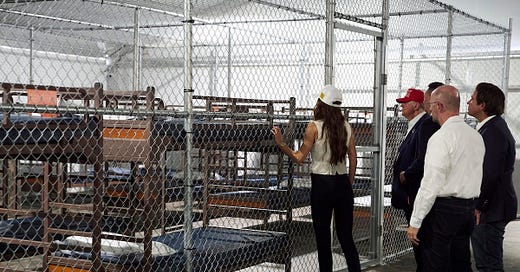Week 34 - The Return
Experts in authoritarianism advise to keep a list of things subtly changing around you, so you’ll remember.
This week was a lot! The week opened with debate over Trump’s attack on Iran front and center, as increasing evidence came forward (I wrote more here) that the strikes did not in fact “obliterate” Iran’s nuclear sites. Trump and his regime sought to change and control the narrative on Iran by attacking the media, and calling those who questioned the outcome various forms of unpatriotic. Trump’s ‘big, beautiful’ and very unpopular tax bill passed the Senate, 51–50, as details emerged that it would balloon the national debt by $3.3 trillion, benefit the top 20% of earners, harm the bottom 20%, and kick at least 17 million Americans off of Medicaid. Two Republicans who were against the bill, and have stood up to Trump and been the target of his threats, said they would not seek re-election in 2026. Meanwhile, with one week to go until July 9, the end date of Trump’s 90-day tariff pause, not a single deal has been finalized. With all this happening, he harkened back to ole faithful, immigration, with a trip to Florida’s hastily constructed ‘’Alligator Alcatraz,’ to change the subject to his comfort zone, even as his polling numbers on immigration continue to fall.
The pushback to Trump suffered a major blow this week, with a Supreme Court ruling that will limit nationwide injunctions by federal courts to state or region. Notably, the 6–3 majority opinion was written by Justice Amy Coney Barrett, who has previously been chastised and threatened by Trump and his supporters, but with this ruling was showered with his praise. The ruling will have major impacts on the ability to slow or halt Trump’s agenda.
While all this is happening, it is important to not lose sight of what is happening at our federal agencies. Health and Human Services Secretary Robert F. Kennedy, Jr. convened a panel of anti-vaxxers to make decisions on vaccinations, more than 200 employees of the Environment Protection Agency said in a letter that their agency is being politicized, and more. Read the full list if you can. Also noteworthy is the continued targeting of schools and colleges, with ongoing cuts, freezing of funding, and legal threats. Notably, the president of the University of Virginia resigned this week under pressure from Trump and conservatives.
A Gallup poll found a sharp decline in pride of being American: Democrats hit an all-time low of 36%, down from 80% in 2015. Independents hit an all-time low of 53%. Republicans held relatively steady at 92%. In 2001, Republicans were at 90%, Democrats 87%, and Independents 84%.
On Wednesday, in a new assessment, CIA Director John Ratcliffe cited a “body of credible intelligence,” including “historically reliable” sources and methods, finding the strikes had “severely damaged” Iran’s nuclear program.
Director of National Intelligence Tulsi Gabbard also sought to downplay the Defense Intelligence Agency (DIA) report leaked in Week 33, saying“new intelligence confirms” that Iran’s nuclear facilities have been “destroyed” and will take “years” to rebuild.
Trump told reporters that the U.S. and Iran would talk next week, adding, “We may sign an agreement. I don’t know, to me, I don’t think it’s that necessary,” and claimed that the conflict was effectively “over” after the strikes, and the strikes had “obliterated” the three nuclear sites.
Trump also accused the media of unpatriotic behavior for reporting skeptically on the Iran strikes. Critics accused Trump of politicizing intelligence and pressuring officials to make an assessment that may be premature.
While Trump said, “We finished them off. I don’t believe that they’re going to go back into nuclear anytime soon,” the Iranian foreign minister said on Iranian State TV that the facilities were not destroyed and his country will have leverage in negotiations.
A Reuters/Ipsos poll found 79% of Americans said they worried that Iran may target U.S. civilians in response to the U.S. airstrikes, and 84% said they worried in general about the growing conflict. Some 36% said they supported the strikes.




